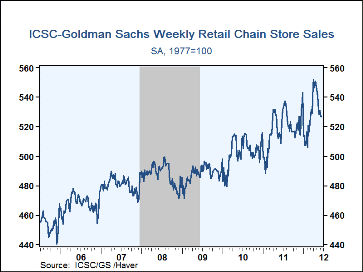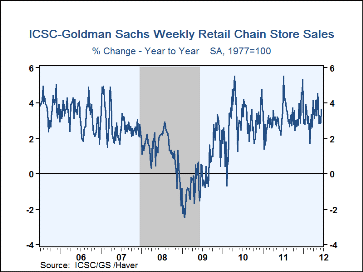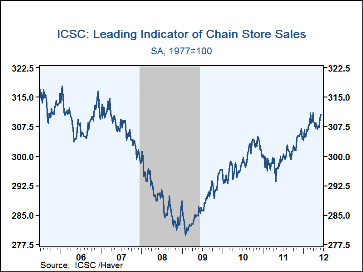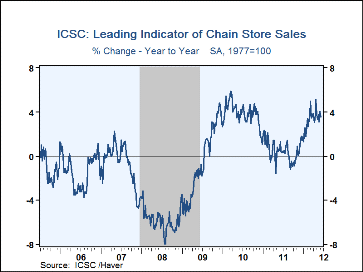 Global| Jun 20 2012
Global| Jun 20 2012U.S. Chain Store Sales Remain Low
by:Tom Moeller
|in:Economy in Brief
Summary
Consumers showed a further disinclination to spend freely last week. Chain store sales were essentially unchanged w/w (3.6% y/y) and remained at the lowest level in two months. Sales in June are 3.9% below the high April average. [...]
Consumers showed a further disinclination to spend freely last week. Chain store sales were essentially unchanged w/w (3.6% y/y) and remained at the lowest level in two months. Sales in June are 3.9% below the high April average. During the last ten years there has been a 72% correlation between the y/y change in chain store sales and the change in retail sales at general merchandise stores. That correlation recently has increased.
General merchandise store sales account for 15% of total retail sales. The ICSC-Goldman Sachs retail chain-store sales index is constructed using the same-store sales (stores open for one year) reported by 78 stores of seven retailers: Dayton Hudson, Federated, Kmart, May, J.C. Penney, Sears and Wal-Mart.
The leading indicator of purchases at chain stores suggested better sales to come. It added 0.3% during the week of June 9 to its 0.7% gain during the week prior and was at its highest level since late-March. The composite leading economic indicator is compiled from four series: (1) The MBA's volume index of mortgage applications for home purchase, (2) the ABC News/Money magazine's survey of consumer buying conditions, (3) new filings for jobless benefits, and (4) the 30-year government bond yield.
The chain store sales data are in Haver's SURVEYW.
| ICSC-UBS (SA, 1977=100) | 06/16/12 | 06/09/12 | 06/02/12 | Y/Y | 2011 | 2010 | 2009 |
|---|---|---|---|---|---|---|---|
| Total Weekly Chain Store Sales | 527.0 | 526.8 | 530.7 | 3.6% | 3.2% | 2.9% | 0.1% |
Tom Moeller
AuthorMore in Author Profile »Prior to joining Haver Analytics in 2000, Mr. Moeller worked as the Economist at Chancellor Capital Management from 1985 to 1999. There, he developed comprehensive economic forecasts and interpreted economic data for equity and fixed income portfolio managers. Also at Chancellor, Mr. Moeller worked as an equity analyst and was responsible for researching and rating companies in the economically sensitive automobile and housing industries for investment in Chancellor’s equity portfolio. Prior to joining Chancellor, Mr. Moeller was an Economist at Citibank from 1979 to 1984. He also analyzed pricing behavior in the metals industry for the Council on Wage and Price Stability in Washington, D.C. In 1999, Mr. Moeller received the award for most accurate forecast from the Forecasters' Club of New York. From 1990 to 1992 he was President of the New York Association for Business Economists. Mr. Moeller earned an M.B.A. in Finance from Fordham University, where he graduated in 1987. He holds a Bachelor of Arts in Economics from George Washington University.










